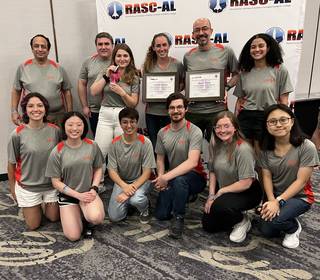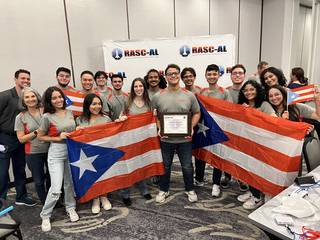University teams from across the U.S. presented their space mission designs at NASA’s annual Revolutionary Aerospace Systems Concepts – Academic Linkage (RASC-AL) competition, held June 12-14 in Cocoa Beach, Florida.
Taking home top prize, the Massachusetts Institute of Technology presented their concept, “Pale Red Dot: Polis-based Architecture for the Long-term Exploration of the Red planet, with Exciting and Diverse Developmental Opportunities to Thrive” in the Homesteading Mars theme. The University of Puerto Rico – Mayagüez took second place overall for their concept, “PROMISE: Permanent Research Outpost for Mars and Interplanetary Space Exploration,” also in the Homesteading Mars theme. These teams will receive a travel stipend to present their work at the 2023 Accelerating Space Commerce, Exploration, and New Discovery (ASCEND) Conference in Las Vegas, Nevada, October 23–25, 2023.
RASC-AL is one of NASA’s longest running higher education competitions. It encourages students to provide in-depth technical analysis and innovative solutions to some of the agency’s toughest challenges. This year, the competition challenged university teams to develop new concepts to improve NASA’s ability to operate on the Moon, Mars and beyond. Finalist teams responded to one of four themes ranging from supporting lunar operations and tourism at the South and North Poles, to enabling long-term survival on the surface of Mars.
“As we expand humanity’s presence further into the solar system, advancements in space travel and exploration become even more vital for successful missions,” said Patrick Troutman, RASC-AL sponsor, and lead for human exploration strategic assessments at NASA’s Langley Research Center in Hampton, Virginia. “The concepts envisioned and analyzed by these young minds prove the necessity of these competitions and not only furthers the students’ experience, but also provides valuable insights for the Agency.”
Additional 2023 forum awards include:
Best in Theme:
-
Homesteading Mars: Massachusetts Institute of Technology, “Pale Red Dot: Polis-based Architecture for the Long-term Exploration of the Red planet, with Exciting and Diverse Developmental Opportunities to Thrive”
-
Lunar North-Pole Tourism: University of Maryland, “Project Hestia”
-
Lunar Surface Transporter Vehicle: South Dakota State University, “ANTS: Artemis Navigating Transporter System”
-
Multi-Use Platform at L-1: California State Polytechnic University – Pomona, “SciNAP: Science & Network Access Platform”
Other Awards:
-
Best Technical Paper: Georgia Institute of Technology, “Multi-Use L1 Platform: L1 Orbiting Tracking & Uplink Spacecraft (LOTUS)”
-
Best Prototype: South Dakota State University, “ANTS: Artemis Navigating Transporter System”
-
Best Presentation: Virginia Polytechnic Institute and State University, “Multi-Use Lunar Environment Cargo Carrier (MULE-CC)”
RASC-AL is open to undergraduate and graduate students studying disciplines related to human space exploration, including aerospace, bio-medical, electrical, and mechanical engineering, and life, physical, and computer sciences. This year, NASA also encouraged space-minded business, management, and space policy students to participate in the competition. RASC-AL projects allow students to incorporate their coursework into space exploration objectives, work in a team environment and help bridge strategic knowledge gaps associated with NASA’s vision.
RASC-AL is sponsored by NASA’s Moon to Mars Architecture Development Office within the Exploration Systems Development Mission Directorate (ESDMD) at NASA Headquarters and the Space Mission Analysis Branch at NASA Langley. It is administered by the National Institute of Aerospace.
For more information about the RASC-AL competition, themes and 2023 finalists, visit: http://rascal.nianet.org






























